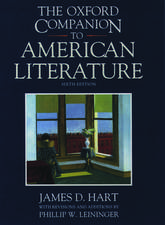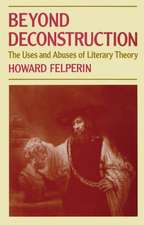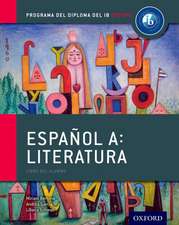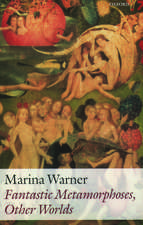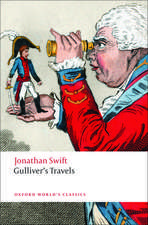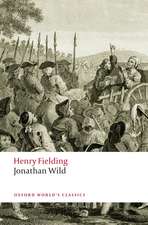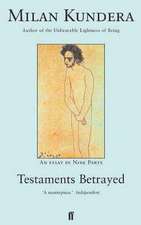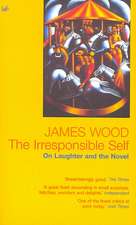God, Gulliver, and Genocide: Barbarism and the European Imagination, 1492-1945
Autor Claude Rawsonen Limba Engleză Hardback – 31 mai 2001
Preț: 594.50 lei
Preț vechi: 897.84 lei
-34% Nou
Puncte Express: 892
Preț estimativ în valută:
113.78€ • 117.88$ • 94.95£
113.78€ • 117.88$ • 94.95£
Carte tipărită la comandă
Livrare economică 11-17 martie
Preluare comenzi: 021 569.72.76
Specificații
ISBN-13: 9780198184256
ISBN-10: 0198184255
Pagini: 420
Ilustrații: 16pp halftone plates
Dimensiuni: 146 x 225 x 26 mm
Greutate: 0.63 kg
Editura: OUP OXFORD
Colecția OUP Oxford
Locul publicării:Oxford, United Kingdom
ISBN-10: 0198184255
Pagini: 420
Ilustrații: 16pp halftone plates
Dimensiuni: 146 x 225 x 26 mm
Greutate: 0.63 kg
Editura: OUP OXFORD
Colecția OUP Oxford
Locul publicării:Oxford, United Kingdom
Recenzii
Rawson has addressed a topic of substantial contemporary importance.
reaffirm[s] Rawson's unassailable pre-eminence as Swift's most challenging, exciting, and erudite modern critic. ... It is a dazzling and disturbing account of the European imagination as it engages with alien tribes and races ... Rawson throws his net wide across the history of barbarism, colonialism, and oppression during a chronological span which the title modestly confines to 1492-1945, but which runs well beyond these dates at either end. ... Rawson's apparently effortless mastery of the rich tapestry of modern and classical literature and history supplies a triumphantly affirmative tribute to the power of civilization.
... a remarkably subtle and generously contextualized study of barbarism and Swift's imagination. It is also a powerful response to politically correct readings of Swift which smooth out contradictions in the thought of this enigmatic and eruptive writer. For those interested in utopian and dystopian studies this is a particularly challenging and valuable book.
Never a scholar to be bound by conventions of periodization ... Rawson has written a book of major importance for genres ranging from Renaissance encounter literature to modern Holocaust fiction. But his greatest gift has always been for torpedoing the prevailing assumptions of eighteenth-century studies, and in this bold new account of Swift, and the implications arising for other writers, he has done it, explosively, again.
[An] erudite, passionate book ... learned, wide-ranging and acute .... [Rawson is] one of the finest 18th-century specialists, who is also a critic of striking flair and delicacy.
Rawson's excellent book analyses the spectrum of aggressions that exists between such figurative use of the language of extermination and its actual fufilment in historical genocides over the last six centuries.
reaffirm[s] Rawson's unassailable pre-eminence as Swift's most challenging, exciting, and erudite modern critic. ... It is a dazzling and disturbing account of the European imagination as it engages with alien tribes and races ... Rawson throws his net wide across the history of barbarism, colonialism, and oppression during a chronological span which the title modestly confines to 1492-1945, but which runs well beyond these dates at either end. ... Rawson's apparently effortless mastery of the rich tapestry of modern and classical literature and history supplies a triumphantly affirmative tribute to the power of civilization.
... a remarkably subtle and generously contextualized study of barbarism and Swift's imagination. It is also a powerful response to politically correct readings of Swift which smooth out contradictions in the thought of this enigmatic and eruptive writer. For those interested in utopian and dystopian studies this is a particularly challenging and valuable book.
Never a scholar to be bound by conventions of periodization ... Rawson has written a book of major importance for genres ranging from Renaissance encounter literature to modern Holocaust fiction. But his greatest gift has always been for torpedoing the prevailing assumptions of eighteenth-century studies, and in this bold new account of Swift, and the implications arising for other writers, he has done it, explosively, again.
[An] erudite, passionate book ... learned, wide-ranging and acute .... [Rawson is] one of the finest 18th-century specialists, who is also a critic of striking flair and delicacy.
Rawson's excellent book analyses the spectrum of aggressions that exists between such figurative use of the language of extermination and its actual fufilment in historical genocides over the last six centuries.
Notă biografică
Claude Rawson is Maynard Mack professor of English, Yale University. His works include Henry Fielding and the Augustan Ideal Under Stress; Gulliver and the Gentle Reader: Studies in Swift and Our Time; Order from Confusion Sprung: Studies in Eighteenth-Century Literature from Swift to Cowper; The Collected Poems of Thomas Parnell, with F. P. Lock; Satire and Sentiment 1660-1830; and Cambridge History of Literary Criticism: Volume 4: The Eighteenth Century, with H. B. Nisbet.

